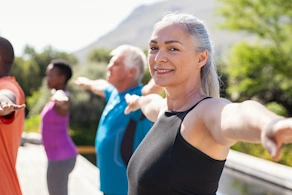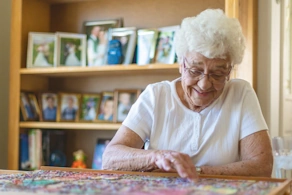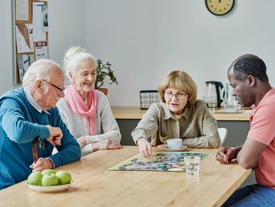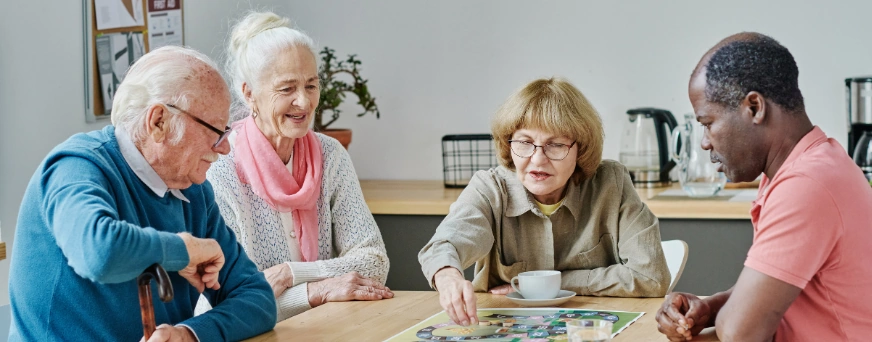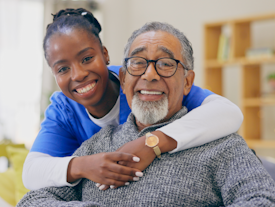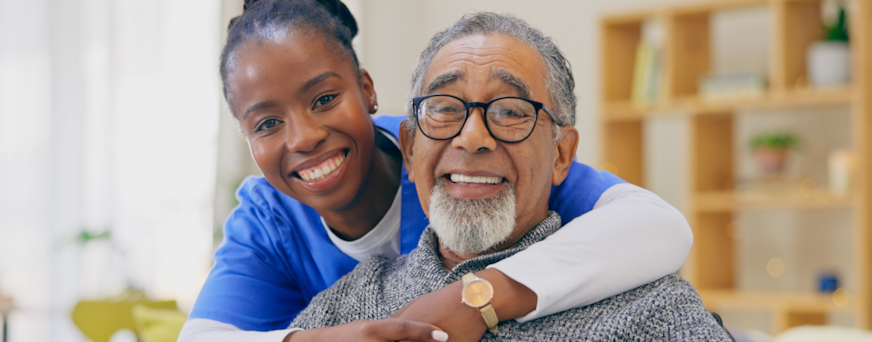How to Improve Elderly Health Awareness Through Community Programs
Our Key Takeaway
Community programs boost elderly health awareness by teaching healthy habits, offering screenings, supporting chronic disease management, reducing isolation, and connecting seniors with local resources. These programs empower older adults and caregivers with practical tools that improve physical, mental, and emotional well-being.
Improving elderly health starts with awareness. Community programs provide practical tips for staying healthy. They cover nutrition, exercise, and common health issues. These programs also link seniors to local health resources.
This makes accessing help easier. Regular participation can improve health and reduce loneliness. Consistent involvement in these programs can significantly enhance seniors' lives. These elderly health awareness programs offer clear guidance and support for healthier lives.
Life Assure Product Quiz
Take our 30 second quiz and discover which Life Assure medical alert device is the right fit for you or a loved ones.
Life Assure Product Quiz
Take our 30 second quiz and discover which Life Assure medical alert device is the right fit for you or a loved ones.
5 Benefits of Community Programs for Seniors

This section covers five key benefits of community programs for seniors. We will look at how these programs promote healthy habits, provide social interaction, connect seniors to resources, teach disease prevention, and support caregivers.
Each benefit shows how these elderly health awareness programs enhance seniors' quality of life.
1. Promotes Healthy Habits
Programs teach seniors how to eat well and stay active. Regular exercise and good nutrition cut the risk of illness. Small changes can boost overall health.
2. Provides Social Interaction
Loneliness affects many seniors. Community programs give them a place to meet others. Regular social contact boosts mood and well-being.
3. Connects Seniors to Resources
Many seniors don’t know about available services. Programs help them find local health services, transportation, and meals. Access to these resources improves their health.
4. Teaches Disease Prevention
Programs provide education on preventing common diseases. They offer screenings and tips on managing conditions like diabetes and arthritis.
5. Helps Caregivers
Caregivers learn how to meet the needs of elderly loved ones. This leads to better care and support for seniors.
How Community Programs Raise Health Awareness?

Community programs improve senior health awareness. They offer health screenings to catch issues early. Nutrition classes teach healthy eating. Exercise groups help maintain fitness.
Programs also provide mental health support and medication management. They offer education on health topics and involve families in care. These efforts ensure better health outcomes for seniors.
Health Screenings
Regular checkups catch problems early. Blood pressure and glucose tests help seniors keep track of their health. Early detection leads to timely care.
Nutrition Classes
Workshops teach seniors about healthy food choices. They learn what foods boost energy and strengthen the immune system. Eating better supports overall well-being.
Exercise Groups
Staying active helps seniors age well. Simple exercises like walking or yoga improve strength and balance. These activities lower the risk of falls.
Mental Health Support
Programs provide a place for seniors to talk about their feelings. This helps reduce stress and improve emotional health. Open conversations lead to better mental well-being.
Medication Management
Managing multiple medications can be tough. Programs teach seniors how to organize their pills and avoid mistakes. Proper management prevents errors and improves health.
Health Education
Programs offer talks on common health concerns like fall prevention or chronic illness. These sessions help seniors stay informed and make better health choices.
Vaccination Drives
Vaccination drives protect seniors from illnesses like the flu. Timely vaccines lower the risk of serious infections. Regular immunizations help maintain good health. They keep seniors safe from common diseases.
Support for Chronic Disease
Programs help seniors manage chronic diseases like diabetes and heart disease. They offer advice on controlling symptoms and staying active. Seniors receive practical tips to improve their daily lives and health.
Technology Training
Learning to use health apps makes managing care easier. Programs teach seniors how to track their fitness and monitor their health from home.
Involving Family
Involving family members helps improve senior care. Programs encourage caregivers to learn and support their loved ones’ health.
Local Healthcare Providers
Partnering with local clinics brings healthcare closer. Programs allow seniors to see doctors more easily and get the care they need.
Fall Prevention
Programs teach balance exercises to prevent falls. Seniors learn simple ways to make their homes safer, reducing the risk of injury.
Fitness Challenges
Friendly fitness competitions help keep seniors active. These challenges encourage regular exercise, which supports heart health and mobility.
Sleep Workshops
Good sleep is important for senior health. Workshops provide tips on how to get better rest, which improves energy and mood.
Social Connections
Spending time with others helps seniors stay engaged. Social activities reduce loneliness and improve both mental and physical health.
Hydration Awareness
Programs teach seniors how to stay hydrated. Drinking enough water prevents health problems and improves energy.
Vision and Hearing Screenings
Regular eye and ear checks catch problems early. Addressing vision and hearing issues helps seniors maintain a higher quality of life.
Dental Health
Programs teach seniors about proper dental care. Good oral health can prevent infections and support overall well-being.
Better Sleep
Sleep workshops show seniors how to improve their rest. Getting enough sleep boosts energy and mood, making it easier to handle daily tasks.
Chronic Pain Management
Programs offer help with pain through physical therapy. Techniques like stretching and relaxation can ease discomfort and improve daily life.
Healthy Cooking Classes
Classes teach seniors to cook nutritious meals. They learn simple recipes that boost health and support a balanced diet.
Stress Relief Techniques
Programs show how to manage stress through methods like meditation. These techniques help reduce stress and improve overall well-being.
Bone Health Awareness
Workshops focus on maintaining strong bones. Seniors learn about calcium-rich foods and exercises to lower fracture risks.
Cognitive Health Activities
Cognitive health activities help keep the mind sharp. Programs offer brain exercises, like puzzles and games. These activities can slow mental decline. They also improve memory and thinking skills. Regular mental workouts support overall cognitive health.
Community Support Groups
Support groups offer a place for seniors to share experiences. Talking with others in similar situations can provide comfort and advice.
Safety Workshops
Safety workshops help seniors make their homes safer. They cover easy changes to prevent accidents. Simple steps like securing rugs or adding handrails can reduce falls.
These adjustments improve overall safety. Regular workshops offer practical advice to keep homes safe and prevent injuries.
Financial Planning Advice
Programs offer guidance on managing finances. Seniors learn to budget and plan for medical costs, which helps reduce financial stress.
Transportation Assistance
Programs assist seniors with transportation. They help find reliable options for appointments and social events. Access to transportation keeps seniors active and engaged.
Emergency Preparedness
Workshops prepare seniors for emergencies. They learn basic steps to stay safe and manage unexpected situations effectively.
Conclusion
Community programs improve elderly health awareness for seniors. They offer education, screenings, and support that help seniors take control of their health. Caregivers also gain valuable knowledge. These programs lead to healthier lives for the elderly.












 Get Help With The Push Of
A Button
Get Help With The Push Of
A Button


